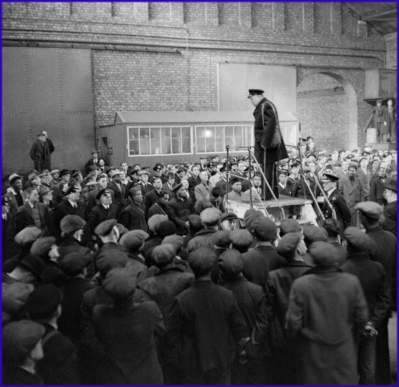
The Palace of Westminster, home of the parliament of the United Kingdom, where Winston Churchill was a member for 62 years.
Churchill has often been described as a great orator. There’s no question his words remain great, but his presentation, by modern standards, often looks and sounds quite weak.
His voice could become quite high, nasal, and excitable sounding. He had a speech impediment that sometimes made him hard to understand and caused him to slur the letter “s.” Parts of his speeches occasionally seem awkwardly structured, perhaps to avoid putting that letter “s” in the middle of a sentence. He wasn’t animated in his presentation, often standing quite passively with his hands on his hips or gripping his lapels. When his hands left his hips, it was often to make awkward gestures. His cadence often seems choppy and hesitant. Any number of politicians or business leaders in Churchill’s day did better, as do many today.
Many of those politicians and other would-be leaders today assume that the occasional great turn of phrase, the chin held high, the mellifluous delivery, the appeal to cheap emotion disguising vacuous ideas, that these mark the speaker as a leader. They don’t.
Churchill built a reputation as a great orator, despite his presentation skills, by artfully building tight, concise, and essentially unassailable arguments (Lincoln had this same ability. He was perhaps even better than Churchill in this respect.). It’s important to note that voice recordings were not common when Churchill was in his prime, and television came along only very late in his long life, so most people read his speeches, rather than hearing them on the radio. This probably accounts in part for his reputation despite his speech impediment.

No teleprompters, no mythic stage, no fake Greek columns, no neutered and adoring press. Just a stooped and frumpy old man on a ladder with his cane, his shoulder bag, his speech impediment, his facts, and his arguments.
While Churchill is known today for his uplifting speeches, he often began his famous wartime speeches on a rather down note, starting with a survey of all the recent problems and failures that were foremost in people’s minds.
He generally followed with an account of the actions of the armed forces as they had countered the blows of the enemy. This was often followed by a narrative of what Churchill expected to happen next, both positive and negative, and a recital of the actions the government was taking to anticipate and prepare for future enemy actions. Along the way he built his argument that there was reason for cautious optimism despite all the bad news. There is something of a pattern to this in his speeches.
There is a saying about preparing a speech: Tell them (the audience) what you are going to tell them, then tell them, then tell them what you told them. The best known parts of Churchill’s speeches are often the last part, the summation of all that he had said before, that “tell them what you told them” moment. The best known parts of Churchill’s famous “We shall fight on the beaches” speech is a perfect example of this. (This speech is, incidentally, another illustration that Churchill thought in terms of a system.)
Churchill essentially repeated what he had said earlier in the speech — that things are looking bad, but Britain was, for the moment, fighting in France, on the ocean and in the air, that aircraft production was rising, that there may be amphibious landings “on the beaches” or an airborne invasion arriving “on the landing grounds,” and so on. He had detailed contingency upon contingency for defense of the island, along with a plan for eventually taking the fight back to National Socialist Germany.
As it turned out, most of the contingencies remained only that — contingencies. In the end there was indeed fighting in the hills and streets — of the National Socialist Germany that had been so anxious to start the worst war in human history.
(For the record, nazis hated being called “nazis”. The term is taken from the German pronunciation of the first two syllables of the German name of the National Socialist German Workers Party — Nationalsozialistische Deutsche Arbeiterpartei. In the Bavarian culture where the nazis grew up, “nazi” had been a term of disparagement akin to “Bozo” or “clown” In English. These creatures identified themselves as German nationalists and socialists, and wanted to be called socialists — National Socialists. Today, when so many people freely throw the term “nazi” at people whose ideas they dislike, I think it’s helpful to be clear about just exactly what a nazi was — a National Socialist.)
The point is that Churchill wasn’t just posing and making hollow boasts. He carefully built his arguments on facts. You should do the same. Leave the rah-rah speeches for the movies and for poseurs. Only when you can actually see the system, when you know the facts, and can build arguments on the system and the facts, can you be an effective communicator.
More Leadership Lessons from Winston Churchill:
Listen.
Ask questions.
Give clear directions.
Don’t get angry at challenges to your ideas. Learn from them.
In most cases, it isn’t the person, it’s the process.
Learn to think in terms of a system.
Go and see for yourself.
Measure a lot of things, and have something to compare them to.
Have courage. Tell the truth, and expect others to do the same.
Great oratory is built on great arguments. Master your facts and your arguments first.
Copyright 2015, 2018 by Paul G. Spring. All rights reserved.
